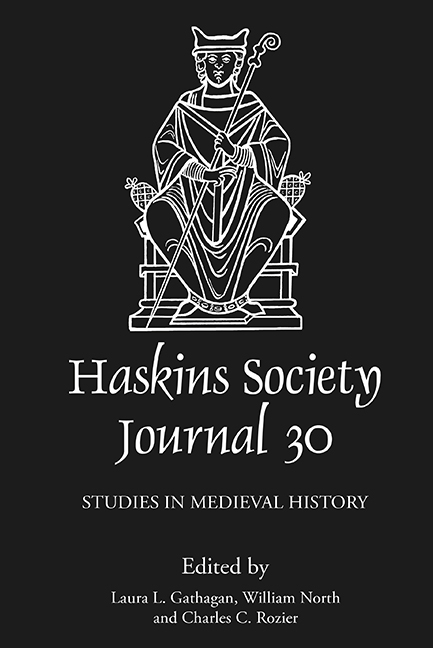Book contents
- Frontmatter
- Contents
- List of Figures and Tables
- Editor's Note
- Abbreviations
- 1 Beyond Corfe: Ælfthryth's Roles as Queen, Villain, and Former Sister-in-law
- 2 Medieval Curses and Their Users
- 3 ‘Although He Was His Nephew’: A Study of Younger Hautevilles Either Side of the Sea
- 4 Nearly Gold and Nearly Perfect? Copper, Meaning, and Materiality in Norman Sicily
- 5 Bound by Loyalty: Conflict, Communication and Group Solidarity in Early Twelfth-Century Southern Italy
- 6 Hugh of Lincoln and Adam of Eynsham: Angevin Kingship Reconsidered
- 7 Earthly Kings, Heavenly Jerusalem: Ralph Niger's Political Exegesis and the Third Crusade
- 8 ‘Holy Christendom's New Colony’: The Extraction of Sacred Matter and the Colonial Status of the Latin Kingdom of Jerusalem
- 9 Medieval French Peasants: The New Frontier?
5 - Bound by Loyalty: Conflict, Communication and Group Solidarity in Early Twelfth-Century Southern Italy
Published online by Cambridge University Press: 30 April 2020
- Frontmatter
- Contents
- List of Figures and Tables
- Editor's Note
- Abbreviations
- 1 Beyond Corfe: Ælfthryth's Roles as Queen, Villain, and Former Sister-in-law
- 2 Medieval Curses and Their Users
- 3 ‘Although He Was His Nephew’: A Study of Younger Hautevilles Either Side of the Sea
- 4 Nearly Gold and Nearly Perfect? Copper, Meaning, and Materiality in Norman Sicily
- 5 Bound by Loyalty: Conflict, Communication and Group Solidarity in Early Twelfth-Century Southern Italy
- 6 Hugh of Lincoln and Adam of Eynsham: Angevin Kingship Reconsidered
- 7 Earthly Kings, Heavenly Jerusalem: Ralph Niger's Political Exegesis and the Third Crusade
- 8 ‘Holy Christendom's New Colony’: The Extraction of Sacred Matter and the Colonial Status of the Latin Kingdom of Jerusalem
- 9 Medieval French Peasants: The New Frontier?
Summary
In southern Italy during the six months between July 1127 and January 1128 a highly disparate group of political actors came together to form a short-lived coalition which, although quite spectacularly unsuccessful, had a profound influence on the history of the twelfth century. The unexpected death of Duke William of Apulia on 28 July 1127 in the prime of his life and without a natural heir precipitated the events. William's cousin, Count Roger II of Sicily and Calabria, was the first to react and claim the duchy for himself. Roger found ready acknowledgement among the citizens of Salerno, Williamʼs most important residence. He also gained the support of some nobles and cities in the region. His opponents, however, included Pope Honorius II and a number of the leading noblemen and prelates of southern Italy. Most notably, the princes of Capua and Bari, the counts of Conversano, Andria and Caiazzo and the bishop of Troia organized themselves into a sworn association to hinder his succession. While this coalition ultimately failed in its goal – between 1128 and 1130 almost all of its members recognized Roger as duke, mostly under military pressure – the constellation of persons, interests and positions opposed to Roger's accumulation of power that it represented lived on and continued to exercise an important influence on events surrounding the establishment of the Kingdom of Sicily. In this essay, I investigate how and why this alliance formed.
At first glance, it would seem that the subject has been more than sufficiently treated. Besides the classical studies of Erich Caspar, Ferdinand Chalandon and Evelyn Jamison, the conflicts prior to and following the creation of the Kingdom of Sicily have been discussed by Josef Déer, Dione Clementi, Hubert Houben and – in numerous insightful publications – Graham A. Loud. Nevertheless, central questions surrounding the reasons for this coalition's initial formation have yet to be convincingly answered. The general assumption, to be found in older as well as more recent literature, is that Pope Honorius II rallied opposition to Roger II. While concurring in this view, historians have differed regarding the reasons for the pope's rejection of Roger II as duke of Apulia. Three main explanations have emerged. One points to strategic considerations: Honorius preferred a fragmentary political landscape in southern Italy, considering this easier to control than a united polity.
- Type
- Chapter
- Information
- The Haskins Society Journal 302018. Studies in Medieval History, pp. 107 - 132Publisher: Boydell & BrewerPrint publication year: 2020



